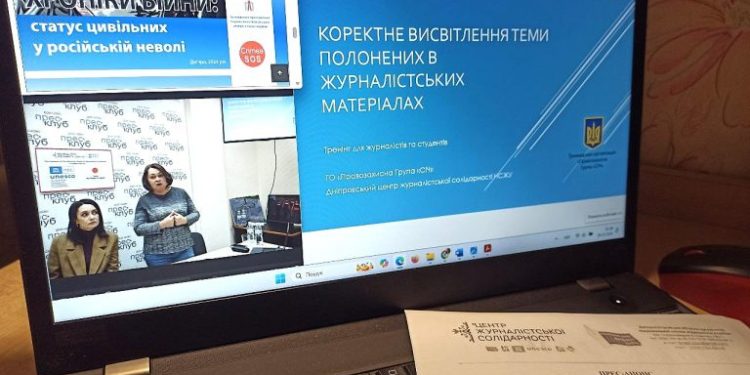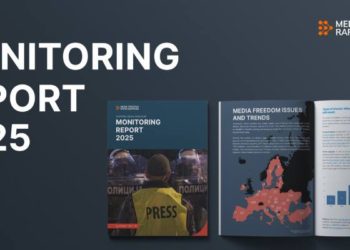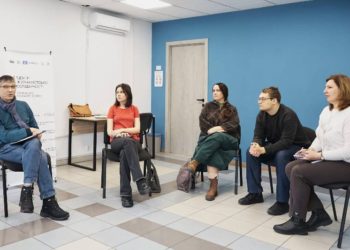The other day, a training was held at the Dnipro Journalists’ Solidarity Center of the National Union of Journalists of Ukraine (NUJU), conducted by representatives of the public organization Human Rights Group SICH. Experienced media professionals, teachers of specialized faculties, and students, together with experts, spoke about the correct coverage of the topic of prisoners in journalistic materials.
Such training sessions have become traditional – so that media professionals conduct high-quality communication, provide readers with reliable information, and do not harm those who are so eagerly awaited at home. This time, attention was focused on the sensitive topic of captivity. Thousands of Ukrainians are currently in russian captivity. Not only military personnel, but also civilians who ended up in prisons because of their beliefs, views, and sometimes even the usual arbitrariness of the russians.
According to experts from the Human Rights Group SICH Nataliya Kozhyna and Ksenia Onishchenko, the captivity of defenders is mentioned in various international acts. The situation is different for civilians. They are protected by international law. But the enemy does not pay attention to this. Therefore, before writing about a civilian who is in captivity, you need to contact the relevant institutions to verify the facts known to you.
Remember: publishing unverified information can harm not only the military but also civilians.
“The status of civilians can change during the time they are in russian captivity. For example, a person can be illegally (arbitrarily) detained and later acquire the status of a person who has disappeared under special circumstances. This is due to the nature of the unlawful actions of the occupiers, which are characterized by a certain duration in time. Human rights activists use the appropriate terminology to legally assess these phenomena. Media professionals should also understand the terms. This is necessary so that the content of your article or news is understandable not only to Ukrainians but also to the world, the experts noted.
Human rights activists gave a number of recommendations for covering this sensitive topic in the media:
- Any journalistic material related to Ukrainian prisoners attracts the attention of society. Be aware of your responsibility and do not cause harm. Verify information before distributing it. Contact specialized services and departments for this.
- Do not distribute materials from “personal sources.” This information may be resonant but not true. Follow the “silence regime.”
- Understand the terminology. There is no such thing as a “civilian prisoner” in international law. Use the Memo on the procedure for correctly determining the legal status of civilians in russian captivity. It will help make your material understandable to the world community.
- Do not write in your article about the “political views,” “place of service,” “field of activity,” or “relatives” of a civilian prisoner. The enemy is watching the Ukrainian information space. Such data about a citizen can cause a meticulous attitude of the russians and, therefore, harm the exchange process or even threaten life.
- As for military prisoners, do not distribute information about their call signs, military unit, location of the unit’s deployment, or military specialty.
- Try not to use photos of the prisoner’s relatives and friends in your articles, even if people give their consent. It is better to clarify the appropriateness of such illustrations with specialized institutions.
- Make links to the original source. Headlines should be clear. The topic of captivity is too sensitive for our society. Do not write for the sake of clicks; write for the sake of objective information.
- Media workers should understand the main rule: collect facts and testimonies, inform society, and document war crimes. Specialized services are engaged in searching for missing persons or freeing prisoners, and the work of journalists should not harm this in any way.
Call the Dnipro JSC by dialing 050 919 8479 (JSC coordinator Nataliya Nazarova). The Center’s address is 8 Starokozatska Street.
ABOUT JSC
The Journalists’ Solidarity Centers is an initiative of the NUJU implemented with the support of the International and European Federations of Journalists and UNESCO. The initiative is designated to help media representatives working in Ukraine during the war. The Centers operate in Kyiv, Lviv, Ivano-Frankivsk, Chernivtsi, Zaporizhzhia, and Dnipro and provide journalists with organizational, technical, legal, psychological, and other types of assistance.
ABOUT UNESCO
UNESCO is the United Nations Educational, Scientific, and Cultural Organization. It contributes to peace and security by promoting international cooperation in education, sciences, culture, communication, and information. UNESCO promotes knowledge sharing and the free flow of ideas to accelerate mutual understanding. It is the coordinator of the UN Action Plan on the Safety of Journalists and the Issue of Impunity, which aims to create a free and safe environment for journalists and media workers, thus strengthening peace, democracy, and sustainable development worldwide. UNESCO is working closely with its partner organizations in Ukraine to provide support to journalists on the ground.
The designations employed and the presentation of material throughout this digest do not imply the expression of any opinion whatsoever on the part of UNESCO concerning the legal status of any country, territory, city, or area or its authorities or concerning the delimitation of its frontiers or boundaries.
The authors are responsible for the choice and the presentation of the facts contained in this digest and for the opinions expressed therein, which are not necessarily those of UNESCO and do not commit to the organization.
Dnipro JSC information service

 THE NATIONAL UNION OF
JOURNALISTS OF UKRAINE
THE NATIONAL UNION OF
JOURNALISTS OF UKRAINE
















Discussion about this post